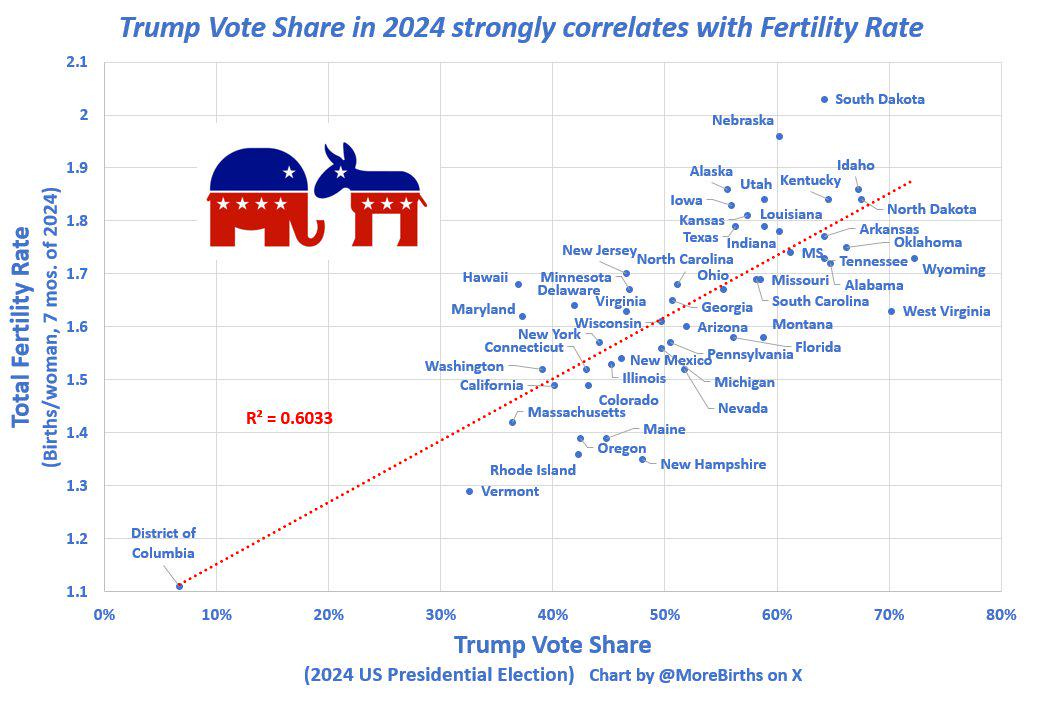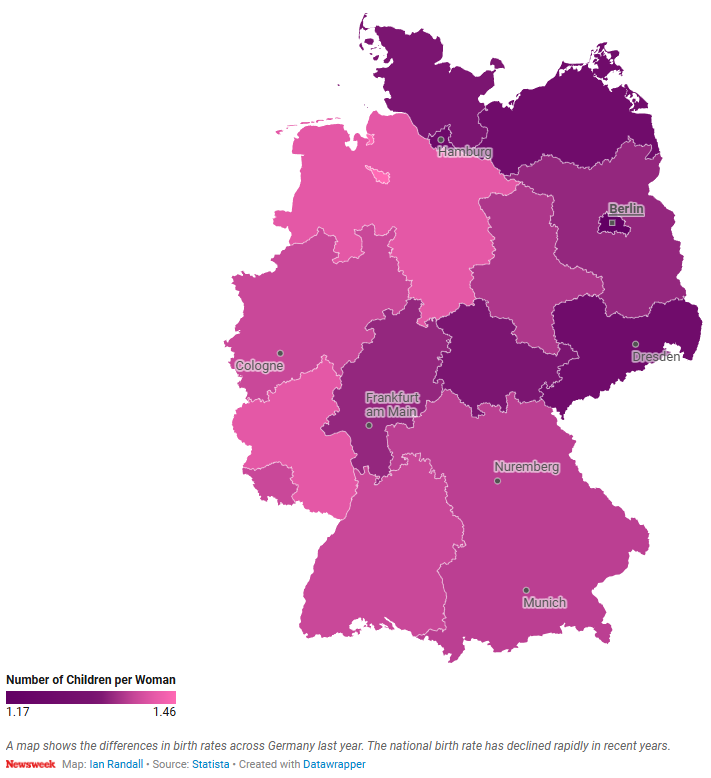Repronews #54: Does gene editing violate human dignity?
Generation Study podcast; 1/3 young Americans don't want children; South Korea natalist plan; Germany fertility down to 1.35; 18 genes for neuroticism revealed

Welcome to the latest issue of Repronews! Highlights from this week’s edition:
Repro/genetics
Ozan Gurgac makes the case for heritable genome editing while preserving human dignity
Podcast explores Genomics England’s Generation Study sequencing the genomes of 100,000 newborns to screen for diseases
Population Policies & Trends
U.S.: One-in-three Zoomers and Millenials don’t want children
South Korea expands parental leave, fertility coverage, and flexible work to boost birth rate
German fertility rate fell to 1.35 in 2023
Genetic studies
Study of 394,000 white British genomes reveals 18 new genes for neuroticism
Further Learning
Repro/genetics
“Moral equality and reprogenetic autonomy in the genomic era” (Politics & the Life Sciences)
Ozan Gurcan, a philosopher at the California Institute of Technology, questions the arguments against heritable therapeutic gene editing and somatic (non-heritable) gene editing for enhancement on grounds on human dignity.
UNESCO’s 1997 Universal Declaration on the Human Genome and Human Rights (UDHGHR) states: “The human genome underlies the fundamental unity of all members of the human family, as well as the recognition of their inherent dignity and diversity. In a symbolic sense, it is the heritage of humanity.”
On this basis, the Declaration calls for banning human reproductive cloning and “the identification of practices that could be contrary to human dignity, such as [heritable] germline interventions.”
In 2015, the International Bioethics Committee (IBC, an advisory body to UNESCO) argued somatic genetic enhancements and non-medical genetic selection “jeopardize the inherent and therefore equal dignity of all human beings.”
The IBC argued for a conservative approach to germline modification: “we are human because of the interplay of many biological, historical, and cultural determinants, which preserve the feeling of our fundamental unity and nourish the richness of our diversity. This is why the human genome is one of the premises of freedom itself and not simply raw material to manipulate at leisure.”
Gurcan argues that gene editing does not violate human dignity under certain conditions and that parents’ reprogenetic autonomy should be respected. In particular, frameworks for the use of heritable gene editing should:
Prohibit the infliction of a shortened lifespan or pain upon the child.
Prohibit the actualization of demeaning beliefs or intentions such as viewing certain groups as inferior.
Prohibit choice resulting from an expression of unwillingness to love and care for the child.
With regard to somatic genetic enhancements, potential negative effects of the enhancement on others, if any, should be reasonably addressed via social changes. For example, genetic discrimination in areas like employment and insurance could be banned. On the other hand, enhancing memory function to better perform in academic or professional settings could be justified, provided it does not stem from a negative view of less naturally capable individuals.
Gurcan argues the following points could be included in future human rights declarations to protect the rights of non-enhanced people:
Those with genetic enhancements for a particular ability and those without are equals.
States shall ensure that all can be participants in society. They shall implement and enforce anti-discrimination laws that address potential biases against those who have (or have not) made use of genetic technologies.
States shall enact laws that protect individuals from being coerced into using enhancements, whether by employers, educational institutions, or through more general societal pressure.
States shall consider providing subsidies for, and only for, enhancements that are universally desired to ensure they are accessible to all who would like to make use of them.
States shall ensure that individuals are not excluded from opportunities due to changing societal demands for goods, services and required skills, by appropriately meeting the basic needs of all.
Podcast: “Whole genome sequencing at birth—implementing the Generation Study” (PET)
Sarah Norcross, Director of fertility care advocacy group PET, and guests discuss Genomics England’s Generation Study to conduct whole genome sequencing (WGS) of 100,000 newborns to screen for rare genetic diseases and pilot the desirability of newborn WGS for health and research.
A previous PET survey had found 53% of people in the United Kingdom would support the National Health Service (NHS) providing WGS for rare diseases to all newborn babies. Only 10% opposed.
In 2002, Craig Venter, one of the lead scientists who sequenced the first whole human genome, said that “within 10 years every baby born in a hospital in this country will have its whole genome repertoire determined. Their parents will have it on a DVD or whatever is the new media is at that time.” As often in science, the timing was overoptimistic.
The guests are people working directly on the Generation Study.
More on repro/genetics:
ASRM and ESHRE will hold a joint meeting on best practices in reproductive medicine in Lisbon on 13-15 March 2025, the first in over 10 years. (ESHRE)
“Genomic sequencing used to diagnose mitochondrial disease” (PET)
Population Policies & Trends
“One in three young [Americans] don’t want children as U.S. birth rate falling” (Newsweek)
1/3 Gen Zers and millennials do not have and do not want to have children, according to a new report on young people and the American dream by the Independent Centre.
The polling showed 30% of Gen Zers (people born between 1997 and 2012) and Millennials (people born between 1981 and 1996) did not have or want any children. 62% said they had or wanted to have children, while 9% were unsure. The poll has a margin of error of plus or minus 2.83 percentage points.
The Centers for Disease Control and Prevention (CDC) announced in April that the general fertility rate, which measures the number of live births per 1,000 women of childbearing age, had hit a “historic low.”
23% of those surveyed said they believed having children is irresponsible because of climate change. 60% said the opposite and 17% were unsure.
Amy Blackstone, a sociology professor from the University of Maine and the author of Childfree by Choice: The Movement Redefining Family and Creating a New Age of Independence, said: “Millennials have been telling us for years that they are concerned about the impact of humans on our climate, particularly in Western nations where our carbon footprints are grotesquely high.”
In 2022, the United States contributed 13.61% of global CO2 emissions while making up only 4.2% of global population. By contrast, the European Union contributed 7.43% of global emissions and made up 5.6% of the world’s population.
“Many childfree people are beginning to view their status as nonparents as a part of their identity that shapes their experience in society,” Blackstone added, citing the many #childfree posts on TikTok showing the label is becoming part of identity politics with “the assertion that being childfree is a meaningful category that deserves recognition in its own right.”
Ben Carson, a former secretary of housing and urban development and the founder and chair of the American Cornerstone Institute, is among the public figures worried about the shifting attitudes toward parenthood among young people and in particular environmental antinatalists. Carson previously wrote for Newsweek: “Their movement is anti-human, anti-family, and anti-life—and Americans should wholeheartedly reject this ideological denigration of the nuclear family and instead cherish the beauties of family life.”
“South Korea announces new family plans amid plummeting birth rate” (Newsweek)
South Korea announced a new set of measures to make life easier for parents to counter the nation’s birth rate collapse, which President Yoon Suk Yeol has called a “national emergency.”
The country’s fertility rate, the world’s lowest, fell further last year, to 0.72 per woman, from 0.78 in 2022. If the trend holds, every new South-Korean generation will be one third the size of the previous generation.
Family-unfriendly work conditions and the high cost of urban living are often cited as a factor driving the trend.
Over 16 years, South Korea has invested over $200 billion (about 0.75% of GDP) in pronatalists policies such as cash incentives, fertility treatment subsidies, and childcare services.
The Presidential Committee on Ageing Society and Population Policy outlined new and in-the-works initiatives in a new report.
The South-Korean parliament has recently passed legislation to extend parental and spousal maternity leave and offering more support so employees with young children can reduce their work hours.
Upcoming measures to improve fertility include:
The ceiling for parental leave payments will be raised and applications for combined maternity and paternity leave will be streamlined.
Prenatal and stillbirth leave are being expanded.
Access to and quality of postpartum care centers are being enhanced.
For infertile couples, the government will update policies so that couples keep financial support even if fertility procedures fail.
Tax relief for small and medium-sized enterprises with “excellent work-family balance” policies.
More flexible parental leave. Instead of requiring parents to take two consecutive weeks, they can now opt to split their leave into one-week increments.
As previously announced, South Korea is creating a Ministry of Low Birth Rate Counter Planning.
Attitudes towards marriage and family are changing rapidly. A Ministry of Gender Equality and Family survey published in May revealed that only 38.5% of 13-24-year-olds believe marriage is necessary, down 12.5 points since 2017. 60% said they would not necessarily have children if they do marry.
South-Korean young adults have been called the “YOLO generation.” A recent Hyundai Card report found shoppers in their 20s and 30s have significantly increased their spending at department stores, while savings rates have fallen. The South-Korean central bank found that people in their 30s saved just 28.5% of their income in early 2024, down from 29.4% in 2019.
“New report on Germany’s birth rate causes alarm for experts” (Newsweek)
After several years of growth, German birth rates have had a “massive” decline.
Between 2011 and 2016, fertility rates across Germany rose from 1.38 to 1.59 children per woman. According to the Federal Statistical Office, this was the result of better conditions for families with children and immigration.
The fertility rate then fell from 1.58 in 2021 to 1.35 in 2023.
This represents a fall of 8% in 2022 and 7% in 2023. Provisional data for the first quarter of 2024 shows the trend continuing.
“The coronavirus crisis, the outbreak of war in Ukraine, and the subsequent drop in real income due to high inflation have clearly prompted many young families to put off having children for the time being,” said Joachim Ragnitz of the Dresden branch of the ifo Institute (an economic think-tank).
“Childbearing behavior, expressed by the birth rate, has changed massively in the past three years. It currently stands at just 1.35 children per woman, compared to 1.58 children per woman in 2021,” he added.
Eastern German states have the lowest birth rates. ifo attributes this in part to the declining number of women aged 27-36 in the region.
“Overall, almost 80,000 fewer children were born in 2022 and 2023 than would have been expected,” Ragnitz said.
The country saw 692,989 births in 2023, with mothers having an average age of 30.3 at the birth of their first child.
As of 2022 the percentage of women who choose not to have children stood at 20%, a figure which has been fairly constant in Germany since 2012.
“Politicians would be well advised to monitor these developments more closely, also in order to avoid possible wrong decisions when expanding daycare and schooling,” Ragnitz said.
More on population policies and trends:
“The real reason for the rise in male childlessness” (BBC)
“Why is fertility collapsing, globally?”: A roundup of demographic and economic graphs on the global fertility collapse, with speculation on the role of social media (over 3 hours/day of use in many countries) (Great Gender Divide)
Genetic Studies
“Large-scale exome sequencing identified 18 novel genes for neuroticism in 394,005 UK-based individuals” (NHB)
This study performed a large-scale exome analysis of white British individuals from the UK Biobank, revealing the role of coding variants in neuroticism.
For rare variants, analysis uncovered 14 neuroticism-associated genes.
Heritability of rare coding variants was estimated to be up to 7.3% for neuroticism.
The common identified variants had widespread impacts on neuropsychiatric disorders, cognitive abilities, and brain structure.
Further Learning
“Our brains might help explain why people disagree on politics: Human evolution may have helped differing views persist over time” (SN Explores)
“What’s a burger, sausage or a steak? European Union court rules can legally be used in marketing vegan products” (Genetic Literacy Project)
“Why Christians should embrace gene-editing (Aporia)
Disclaimer: We cannot fact-check the linked-to stories and studies, nor do the views expressed necessarily reflect our own.




The UN declaration on human rights hopelessly mixes positive and negative rights. These cannot be reconciled. Gurcan makes a lot of sense and sounds vastly more reasonable than many bioethicists.
It is amusing that South Koreans save "only" 28.5% of their income while in the USA the number is 4..8%!